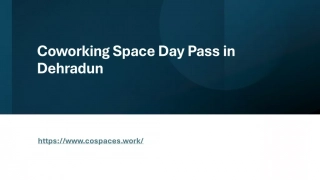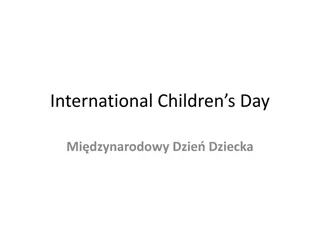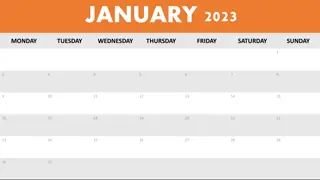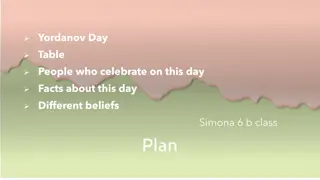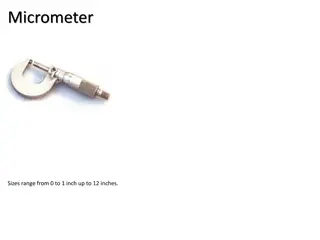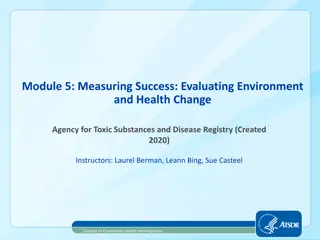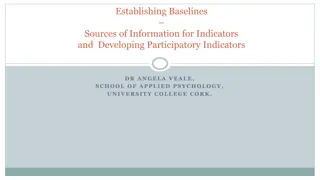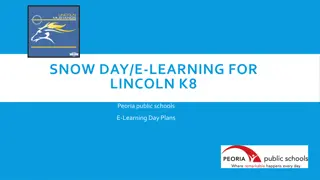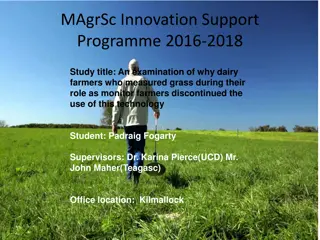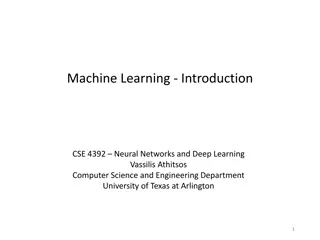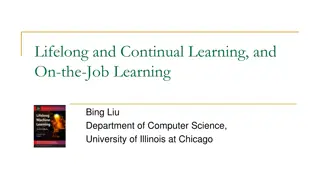
Exploring Definitions and Concepts of Learning
Dive into the various definitions and aspects of learning, including behavior change, critical periods, practice vs. experience, and types of learning such as habituation and classical conditioning.
Download Presentation

Please find below an Image/Link to download the presentation.
The content on the website is provided AS IS for your information and personal use only. It may not be sold, licensed, or shared on other websites without obtaining consent from the author. If you encounter any issues during the download, it is possible that the publisher has removed the file from their server.
You are allowed to download the files provided on this website for personal or commercial use, subject to the condition that they are used lawfully. All files are the property of their respective owners.
The content on the website is provided AS IS for your information and personal use only. It may not be sold, licensed, or shared on other websites without obtaining consent from the author.
E N D
Presentation Transcript
Welcome to P360 Let s go over the syllabus Your first assignment Brief lecture on learning
What is learning? Definition of learning: Dictionary definition: To gain knowledge, comprehension, or mastery through experience or study. Psychology definition: A relatively permanent change in behavioral potentiality that is not due to maturation or typical physical growth, but is due to (reinforced) practice or experience. Which is better description? Why?
What is learning? Behavioral potentiality: must be measurable behavior change Direct or indirect measurement? But when must behavior occur? Immediately after learning? Within 1 year? Issue of learning vs. performance- is this an important distinction?
What is learning? Must learning result in relatively permanent behavioral change? Define permanent and define behavior Instinct- instinctual behaviors may emerge at different time periods Importance of critical periods Walking- learned or instinct? Memory issues How much cognition is necessary? Can bacteria learn? Definition of behavior: If a dead man can t do it .it isn t behavior!
Definitions of learning? Learning: experience, practice or performance? Reflexes: Are they important for learning? Instincts: imprinting and critical periods Practice vs. Experience Which results in better learning? Which is more efficient? How do we design better learning environments?
Definitions of learning? Modified definition of learning: learning is a relatively permanent change in behavior or behavioral potentiality that results from experience and cannot be attributed to temporary body states (e.g., fatigue, altered states of consciousness)
Definitions of learning? Types of learning: Habituation Sensitization Classical conditioning Instrumental or operant Cognition All are part of a continuum: No actual neat and tidy divisions Learning = survival or our strongest instinct
Approaches to study of learning Systematic study. Science defined: combines 2 ancient philosophical positions on origins of knowledge: Rationalism: assumption that one gains knowledge by exercising the mind Empiricism: assumption that sensory experience is basis of all knowledge. We typically engage in rational empiricism: Exercise or expand the mind via gaining knowledge through our sensory experiences But doesn t EVERYONE do this? What makes scientists different?
Aspects of theory: Scientific theory: two critical aspects Formal aspects: Words and symbols of the theory Empirical aspects: physical events that theory attempts to explain Can you have one aspect without the other? Scientific Law: Consistently observed relationship between two or more classes or events All science seek to discover laws!
Goal of Science The goal of science is to: Discover laws of nature Group laws into coherent units These units may become theoretical frameworks In psychology, might add one more goal To improve the condition of humans and animals Clinical applications that emerge from science
Goal of Science Coherent grouping has at least 2 functions: Synthesizing function: systematically explains large group of observations (reinforcement) Heuristic function: points to further research (theoretical building blocks).
Aspects of theory: Kant characterized science as being either nomothetic or idiographic. Nomothetic : tendency to generalize is typical for the natural sciences. describes effort to derive laws that explain objective phenomena in general. Idiographic tendency to specify is typical for the humanities describes the effort to understand the meaning of contingent, unique, and often subjective phenomena. So: Which approach does Psychology use? (and yes, this is a trick question!).
The Principle of Parsimony KISS: Keep It Simple, Stupid! Principle of Economy or Morgan s Cannon When 2 equally effective theories can explain the same phenomenon, but one explains it more simply and economically, use the simpler explanation. Why is this important?
Approaches to study of learning Conducting Experiments and Observations Remember tenets of experiments: IV and DV Arbitrary set ups What is arbitrary? We often do it because it is easy Techniques: Lab vs. naturalistic observation Human vs. animal Correlation or experimental Choosing IVs and DVs Data and interpretations
But does science ever change? Kuhn s views : Paradigms a point of view shared by a substantial number of scientists The school of theory or theoretical school of view Are schools or paradigms good or bad? Paradigm shifts in normal science: Innovations occur when scientists who use a particular paradigm are consistently confronted with events inconsistent with their point of view These shifts emerges only with great resistance
But does science ever change? Scientific revolutions: science occurs through paradigm shifts Our Textbook suggests that paradigm shifts most applicable in physical sciences Argues that paradigm shifts are less applicable to social sciences We tend NOT to have strong paradigms Do you agree?
Does science change? Popper s views: Science often starts with theory, not data collection! Scientific theory = proposed solution to a problem Must be supported with DATA Principle of refutability or Principle of falsification Must show that the proposed solution is not correct Einstein s theory- wonderful theory, but we now know it has wrong solutions
Does science change? Which is a better approach: Kuhn or Popper? Kuhn stresses sociological/psychological factors playing strong role in emergence of science and theories Popper stresses logical refutation of problems as playing stronger role Is it really one or the other?
How do we evaluate theories? Testability (Falsifiability) Theory should make unambiguous predictions that can be tested against the facts. Falsifiability: a good theory is one that, in principle, can be proven wrong is a poor theory if is untestable, or unfalsifiable Simplicity or Parsimony: Given two theories that are equal in testability, one that uses fewer hypothetical constructs and assumptions is the preferred theory
How do we evaluate theories? Generality: Theories that deal w/more phenomena with a greater range of oservations are usually judged to better than those w/less Fruitfulness: Theories that stimulate further research and further thinking about a particular topic are usually judged to be better Agreement w/data: Theories that are supported by data (obviously) are better theories
Learning theory depends upon: Epistemology: Branch of philosophy that deals with nature of knowledge The study of knowledge Asking and examining answers to several critical questions: What is knowledge? What can we know? What are limits of knowledge? What does it mean to know? What are origins of knowledge?
Behaviorism, Science and Behavior Behavior analysis = comprehensive, natural science approach to study of behavior of organisms Determining the controlling and changing factors that affect the behavior of humans and other animals E.g., study of reinforcement What is a reinforcer: a thing? An activity? How does it change behavior? Under what conditions does reinforcement alter behavior?
Behaviorism, Science and Behavior Experimental Analysis of Behavior = natural science approach to understanding behavior REGULATION Applied Behavior Analysis: use of behavior principles to solve practical problems
Two (basic) Kinds of Conditioning Reflex = respondent behavior that is elicited by a biologically relevant stimulus (S) that automatically (unlearned) elicits a stereotyped response (R) Operant or Instrumental Conditioning= Involves the regulation of behavior (R) by its consequences (C)
Selection as a Causal Process Selection by consequences = form of causation Immediate causation: Direct cause Distal or Remote causation: Remote events, such as natural selection, produce causes of behavior change
Selection as a Causal Process Remember: behavior analysis = study of the behavior of organisms Main organizing principle is evolution of behavior through natural selection Typically, we interpret this as biological (genetic) change Behavior analysis sees this differently: Behavior also evolves through natural selection both on the Immediate level Remote or Distal level
Selection as a Causal Process Skinner s Principle of Selection by Consequences Behavior is selected by our environment Which behavior we engage in is selected by the consequences Three levels of this selection: Selection over generations for genes related to survival and reproduction Selection for behavior within the lifetime of an individual organism Selection for behavior patterns in groups of organisms that endure beyond the lifetime of a single individual
Evolution of Behavior? Yes, behavior evolves! Behavioral flexibility is critical for survival We must adjust to our environment and the changing contingencies within that environment Those who don t adapt are .dead.
Evolution of Behavior? B.F. Skinner: This allows for behavior change that occurs on three levels Genetic Cultural Individual Thus: some behavior is genetic, some is cultural, some is learned by the individual. Suggest biology will be important for behavior analysis!
Evolution of Behavior? Operants are selected by their consequences: (Huh?) Your responses are selected by the consequences to that behavior E.g., greetings: Say hi to someone. They smile and say hi back They frown and flip you off Your response will differ to these two consequences. If you are continually punished for saying hi- you will stop If you are continually reinforced for saying hi- you will keep saying hi!
Selection of Behavior on Cultural Levels Don t discuss this as often! Groups of people are shaped by their consequences. Culture = conditions, events, stimuli arranged by other organisms that regulate others of those organisms Dress codes; language; social norms Most come about by operant conditioning Occurs in animals and humans Think about all the cultural norms that you have learned over the years- what contingencies control those behaviors?
So.in summary Theories of learning are: Scientific theories based on coherent units that have been grouped into meaningful groupings These theories rely on systematic observations based on rational empiricism Go for parsimony or KISS
So.in summary The theories attempt to describe Where behavior emerges from How behavior changes and what variables invoke such changes What purpose the behavior serves for the organism Both immediate and distal/remote causation
So.in summary This allows us to Predict and manipulate behavior of other organisms and even ourselves We can use these predictive models for improving the human and animal conditions.

